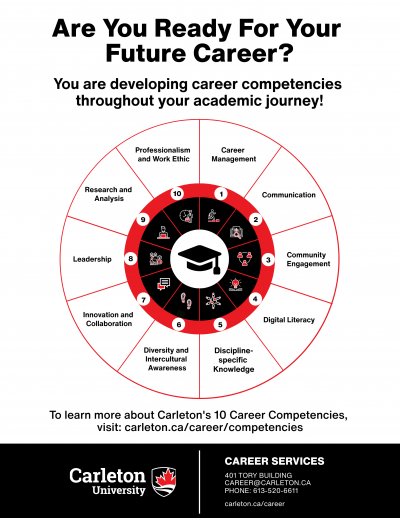What are Carleton University’s Career Competencies?
At Carleton University, you are developing competencies in your courses, projects, and co-curricular activities.
You are specifically developing the following 10 competencies:

- Career Management
- Communication
- Community Engagement
- Digital Literacy
- Discipline-specific Knowledge
- Diversity and Intercultural Awareness
- Innovation and Collaboration
- Leadership
- Research and Analysis
- Professionalism and Work Ethic
Career Management
![]()
Definition
- Identify and articulate skills, strengths, knowledge and experiences relevant to the position desired and career goals and identify areas necessary for professional growth.
- Through openness and curiosity is able to navigate and explore job options, understands and demonstrates a level of adaptability while taking the steps necessary to pursue opportunities, and understands how to self-advocate for opportunities in the workplace.
Sample Transferable Skills in the Classroom
- Communication: Communicate personal strengths to classmates, professors, or professional contacts
- Self-awareness: Identify and articulate skills from course assignments and projects
- Showing Ambition: Develop strategies and goals for your career journey
Communication
![]()
Definition
- Explain information, ideas and opinions effectively in a clear and concise manner; both verbally and in writing.
- Express ideas to others and can write/edit memos, letters, and complex technical reports clearly and effectively.
Sample Transferable Skills in the Classroom
- Written Communication: Write a research paper/essay
- Verbal Communication: Lead a Q&A session after a class presentation
- Visual Communication: Design slides using a software
Community Engagement
![]()
Definition
- Social and civic responsibility demonstrated by meaningful links within the community.
- Establishes mutually beneficial relationships with community members.
- Demonstrates consideration of the welfare of community members in decision- making.
Sample Transferable Skills in the Classroom
- Communication: Writing a Policy Brief
- Research: Conduct Community-Based Action Research
- Facilitation: Facilitating a group meeting with a client
Digital Literacy
![]()
Definition
- Ethically and efficiently, solve problems, complete tasks, and accomplish goals, while leveraging the existing digital technologies.
- Adaptability to new and emerging technologies.
Sample Transferable Skills in the Classroom
- Creativity: Use of digital tools and software to display information
- Technical: Email with professors and classmates
- Research: Perform online research for assignments, reports and projects
Discipline-specific Knowledge
![]()
Definition
- Acquire knowledge related to academic discipline as well as job and/or industry-specific knowledge.
Sample Transferable Skills in the Classroom
- Critical Thinking: Develop arguments from various perspectives
- Problem Solving: Work with classmates to solve a complex problem in a project
- Research: Find appropriate resources for a research paper in a library
Diversity and Intercultural Awareness
![]()
Definition
- Build and manage inclusive relationships and collaborate on a cross-cultural and interdisciplinary level, as well as with local and global engagement.
- Demonstrate an openness, inclusiveness, sensitivity, and respect towards all people and understand individuals’ differences.
- Substantive knowledge of Indigenous peoples and their history through discipline-specific studies and activities.
Sample Transferable Skills in the Classroom
- Personal Management: Demonstrate positive attitudes, through behaviours, initiatives, and energy
- Intercultural Awareness: Research or learn about the history of a culture and/or country
- Teamwork: Show interest and openness in learning about others and learning about their unique perspective
Innovation and Collaboration
![]()
Definition
- Exercise sound reasoning to analyze issues, make decisions, and solve complex problems.
- Obtain, interpret, and use knowledge, facts and data in this process and may demonstrate originality and inventiveness.
- Work within a team structure and can negotiate and manage conflict.
Sample Transferable Skills in the Classroom
- Teamwork: Working with a group for an assignment
- Communication: Presenting ideas to a class
- Conceptualizing ideas: Design mock-ups for a class project
Leadership
![]()
Definition
- Leverage the strengths of others to achieve common goals, and use interpersonal skills to coach and develop others.
- Assess and manage their emotions and those of others; use empathetic skills to guide and motivate; and organize, prioritize, and delegate work.
Sample Transferable Skills in the Classroom
- Active Listening: Listen to group members ideas, while checking in for understanding
- Time Management: Manage school and personal workload
- Teamwork: Contribute to group work, levering the strengths of others
Research and Analysis
![]()
Definition
- Demonstrates the ability to access, analyze and apply knowledge and skills from various disciplines.
- Strategically applies knowledge and skills from past experiences to new situations.
- Assesses situations and identifies problems in order to evaluate solutions and make decisions.
Sample Transferable Skills in the Classroom
- Analysis: Interpreting data and its implications to the real world
- Problem Solving: Use sound reasoning to analyze issues, make decisions, and overcome problems
- Research: Use of different resources and research methodologies to effectively gather, and interpret facts, data, and knowledge
Professionalism and Work Ethic
![]()
Definition
- Demonstrate personal accountability and effective work habits.
- The individual demonstrates integrity, ethical behavior and acts responsibly with the interests of the larger community in mind.
Sample Transferable Skills in the Classroom
- Productivity: Plan, organize and prioritize course work, in addition to having effective study strategies and techniques to complete course work and prepare for exams
- Showing respect: Having open and honest discussions and learning from others
- Organization: Bring all the required materials and books for class, labs, presentations, tutorials, etc.